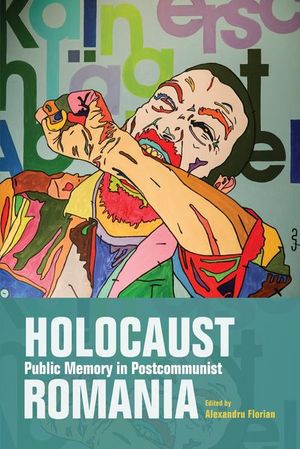Holocaust Public Memory in Postcommunist Romania
Published by Indiana University Press
“An excellent analysis of the slow, but steady, evolution of Romania from heavy Holocaust denial . . . toward a fair confrontation of its tragic past.” —Radu Ioanid, author of The Holocaust in Romania
How is the Holocaust remembered in Romania since the fall of communism? Alexandru Florian and an international group of contributors unveil how and why Romania, a place where large segments of the Jewish and Roma populations perished, still fails to address its recent past. These essays focus on the roles of government and public actors that choose to promote, construct, defend, or contest the memory of the Holocaust, as well as the tools—the press, the media, monuments, and commemorations—that create public memory. Coming from a variety of perspectives, these essays provide a compelling view of what memories exist, how they are sustained, how they can be distorted, and how public remembrance of the Holocaust can be encouraged in Romanian society today.
“While positive changes have taken place, a large gap exists between the historical facts and public knowledge about Romania and the Holocaust. This volume offers a fresh and nuanced understanding of the contemporary ‘battles of memory’ in postcommunist Eastern Europe.” —Diana Dumitru, author of The State, Antisemitism, and Collaboration in the Holocaust
“An excellent and timely addition to European historiography. The book consists of eight chapters, most of them written by scholars affiliated with the Elie Wiesel Institute. It not only shows the challenges faced in remembering Romania’s involvement in the Holocaust, but provides an excellent comparative analysis with other countries in the region.” —Reading Religion
How is the Holocaust remembered in Romania since the fall of communism? Alexandru Florian and an international group of contributors unveil how and why Romania, a place where large segments of the Jewish and Roma populations perished, still fails to address its recent past. These essays focus on the roles of government and public actors that choose to promote, construct, defend, or contest the memory of the Holocaust, as well as the tools—the press, the media, monuments, and commemorations—that create public memory. Coming from a variety of perspectives, these essays provide a compelling view of what memories exist, how they are sustained, how they can be distorted, and how public remembrance of the Holocaust can be encouraged in Romanian society today.
“While positive changes have taken place, a large gap exists between the historical facts and public knowledge about Romania and the Holocaust. This volume offers a fresh and nuanced understanding of the contemporary ‘battles of memory’ in postcommunist Eastern Europe.” —Diana Dumitru, author of The State, Antisemitism, and Collaboration in the Holocaust
“An excellent and timely addition to European historiography. The book consists of eight chapters, most of them written by scholars affiliated with the Elie Wiesel Institute. It not only shows the challenges faced in remembering Romania’s involvement in the Holocaust, but provides an excellent comparative analysis with other countries in the region.” —Reading Religion
BUY NOW FROM
COMMUNITY REVIEWS

